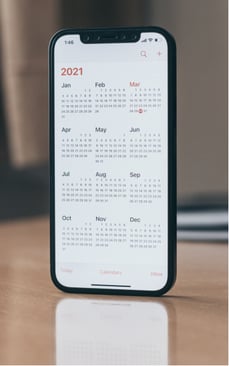You have enrolled in a language course. Congratulations!
You then receive an email saying they still would to 'screen' you to confirm your language level.
Do you panic? Do you think 'I can't speak the target language well at all; that's why I'm taking a training course' or 'I don't have time for this'?
There is no need for doubts - in this blog post, we'll explain why you get this email and why this step is important.
What is a 'screening'?
A 'screening' means assessing oral and written skills to establish the level of proficiency: how well you've already mastered the target language ('target language' is the language you want to learn).
There are different levels that we classify according to the CEFR, the Common European Framework of Reference, namely: A0-A2 (basic knowledge), B1-B2 (independent user) and C1-C2 (proficient user).
> Find out what each CEFR level means here.
Do you have an A1 level? Then we expect you to understand a basic sentence and be able to respond briefly. On the other hand, do you have a B2 level? Then you can effortlessly keep a conversation going, read long articles and understand complex e-mails for instance.
Usually, such a 'screening does not need to be long. Just 10 to 15 minutes is often enough for an experienced screener - the person screening you - to determine your level.
web-1.jpg?width=2048&name=2Photographers_20200310_170503%20(1)web-1.jpg)
Why screening?
We organise screening for several reasons :
1. Your language level
As we've mentioned, the first thing we want to be able to determine is your level of the target language.
The screener will ask you a number of questions in the language for which you have registered, some of which you might expect ("Could you introduce yourself?") but some of which you won't ("Is it really hot in your office?").
It's very important to try and answer these questions in the target language as this will help the screener determine your proficiency level.
You might find it hard to put aside your fear or shyness, but don't be afraid: the screener will never judge you!
People often think that their level is not good enough to answer the questions in the target language, but in reality, answer them just fine!
2. Your job context & learning objectives
We also need to know what sector you work in, what exactly you need the target language for, and to what extent you need to actively master the language.
Find out how to make your learning objectives SMART here.
This information is crucial for us to match you with the right trainer, because every trainer also has their expertise in a particular field. Some specialise in the medical sector; other trainers are a better fit for commercial profiles.
3. Your schedule
Finally, the screener will also ask you when you are (un)available.
The most common answer to this question: "I can always do it" or "I'll adjust".
Hearing that enthusiasm is very nice of course, but in practice, we know that this is not feasible.
Do you have a weekly meeting at a fixed time? Or do you know that your inbox is very busy on Monday mornings for example? Or do you finish early on Tuesdays for personal reasons. Then don't forget to mention that.
This way we can communicate your availability to the trainer, and they won't be surprised if it transpires that you are only available during lunch breaks.
4. In-group training: group allocation
When you register for a group class, it's very important for both you as a trainee and also for the trainer that all participants in that group have more or less the same proficiency level at the start of your course.
To ensure this is the case, we screen each person individually before the specific groups are formed.
Tips for your screening
To sum up, screening is essential for a good start - and for the success of your language training.
Are you wondering how you can prepare yourself for such a screening? Here are some top tips to wrap up:
-
Don't be afraid or shy to speak. A screener will never judge! They will only focus on assessing your level in the target language.
-
Speak in the language you want to learn. This is the only way your level can actually be determined.
-
Find a quiet place for the interview. If necessary, choose a private space where you can speak in the target language without hesitation and feeling self-conscious.
-
Provide as much detail as possible, e.g. why are you taking the course; for what purposes do you need the language, how do you get in contact with the language; how have you learnt the language and so on.
-
Check your schedule well in advance to be able to discuss your availability.

.png)

